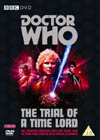DVD Extras include:
Today's planet fares best when being established with its very cool, bizarrely tinted location shots. A great place to see the TARDIS materialize, but too bad it couldn't have landed on a dryer piece of the shore. The Doctor and Peri's exploration scenes are good while on location, but once into the indoor rock corridors, they seem to get trapped in cliché routines. Although a good plot is building, the exploration beats are far from the strongest we've seen on the show.
Compelling CharactersThe cast of characters is fairly strong though, and as more and more of them come into play, the story becomes more and more interesting. Sil is back, and unlike in "Vengeance on Varos" (story no. 139), he actually gets a lot of fun, good quality interaction with Colin Baker's Doctor. Nabil Shaban gives another highly entertaining performance, and is one of the story's biggest and most memorable draws.Other members of Sil's race are present as well. Christopher Ryan brings a very nice character, or pair of characters, to life as Lord Kiv, Sil's slightly eccentric boss. Ryan is probably more famous in Doctor Who circles now for playing leading Sontaran characters in the New Millennium version of the show. Strange that he decided to put on the same voice for such wildly different characterizations. Of course, Brian Blessed's larger than life portrayal of the warlord King Yrcanos threatens to steal the show, but doesn't quite because the rest of the cast is still strong, and Blessed supports and works well with them. But you can expect fantastic energy and unusually surprising choices with the delivery of nearly every one of his lines. Some may question its believability, but its entertainment value is certainly high. In many ways, the appeal is very similar to that of the modern Klingon - the honourable, culturally mysterious, enthusiastic warrior - and Yrcanos comes before Klingons had re-invented themselves in favour of this cult appeal in the Star Trek spinoff series. Sadly the action for this story is a bit of a letdown. Yrcanos is often in the middle of it, but what's really lacking is careful blocking, and the freedom of single camera work. And of course decent laser beams. The demonstration of this story's most prolific weapon on the beach in Part Five works, thanks to close-ups of the weapon and an interesting effect on the target (no doubt helped by the scene's weird tinting) that they couldn't hope to repeat during the later battles. But really, some good superimposed lasers could have brought the story's action up another notch, and video effects man Danny Popkin isn't going anywhere near it. Sad. And then there's Dorf, the half-man, half-dog, werewolf character, listed in the credits as "the Lukoser". Though this idea fits more integrally into the central conflicts of the plot than similar ones back in "Vengeance on Varos", it certainly doesn't bring anything of the kind of charisma I can appreciate to the screen. Mind you, I'm not big on werewolves to begin with, and some seem to think that he's a particularly good one. For me, most of what the character is asked to do when our attention is called to him is cringefully silly and embarrassing. Dorf actually works best when he tags along in the background, and thankfully this is where he ends up most of the time.
The Companion's DilemmaSurprisingly, this story actually gives Peri a lot to do all the way through. In fact, I don't think Nicola Bryant has been this well-served by a script since her introduction in "Planet of Fire" (story no. 135). Instead of being sidelined into a less important "B" plot, or simply tagging along behind the Doctor and others asking clarification questions, there is a real sense of her becoming the audience's touchstone character here, and carrying a good chunk of the main narrative when the Doctor's sanity appears to have gone off the deep end. Peri gets a lot of nice, emotional moments throughout this story.Colin Baker's Doctor also gets to run the gamut of emotion and levels of sanity throughout the adventure, from many heroic and on-the-ball segments, to the flippant, callous, and cowardly as well. While this may echo prior themes from "The Twin Dilemma" (story no. 137), it is far better motivated and more palatable here. Perhaps in part thanks to this story's ability to allow Colin to react to his own behaviour via the trial, it remains easy to continue to root for him all the way through this one, and it helps "Mindwarp" become one of the important stories of his era as well.
In many ways, I think these segments of the trial have helped shape Doctor Who criticism in the years since it was first shown, and helped audiences and writers focus a little better on the actions of the main character of the show, as we wonder what other adventures might be equally fair game for the debate that ensues here. Are his values hypocritical? Does his interference manage to be helpful? Does he do more harm than good? Do others pay too high a price for his heroics? All this "Mindwarp" tackles, to the show's ultimate benefit I think. Very good stuff indeed. Richard Hartley provides a superbly tasteful musical score for the story which works in every scene, and one that appears to be quite minimal and rarely calling attention to itself. While opening sections paint a very otherworldly musical backdrop for the story's alien location to go along with the visuals, the score's most memorable bits are saved for the final episode, particularly with the addition and excellent use of Peri's Theme during her heartfelt talk with Yrcanos. Part Eight is one of the grandest achievements of Colin Baker's era, as it takes us through some unforgettable turning points, nicely built up by increasing tensions in the story. No spoilers here, you'll have to tune in and watch this one. I will just say that it's great that Part Four from the previous story reminded us what usually happens on a typical adventure, meaning that the successful similarities and departures evidenced here in Part Eight have maximum impact. The one caveat I have for the final sequence is the explanation of the motivations of the Time Lords that is thrust at the audience. Firstly, the trial up to this point has featured a Valeyard who knows what is about to be shown on the viewscreen and an Inquisitor who appears to be witnessing events for the first time. Suddenly, this is reversed for no apparent reason, with the Inquisitor becoming a know-all, and it stretches credulity. Secondly, the explanations of events spouted by the Inquisitor don't really hold much logic whatsoever, either scientifically or in terms of motivating characters. We can forgive this somewhat knowing it's a bit of a cover story, something the Doctor thankfully sees through and points out immediately. But couldn't they have come up with a better cover story, something that actually still made sense on the surface?
International Titles:Deutsch: "Das Urteil 5-8: Mindwarp"Magyar: "Egy Idő Lord tárgyalása 5-8: Észcsavar"Français: (Le jugement d'un Seigneur du Temps 5-8: Effaçage de mémoire)Русский: "Суд над Повелителем времени 5-8: Деформация разума"This segment's title is perhaps one of the more tricky ones to articulate in other languages. The French title "Memory Erasure" may be too specific to encompass the entire phenomenon seen in the story. The Hungarian title translates to "Mind-screw", which seems apt, while the Russian is literally "Deformation of the Mind". The Germans seem content to keep the English title for this segment; it was used on their Sixth Doctor Volume 3 DVD box set.
This story is available on DVD and VHS video as the second adventure of the Trial of a Time Lord season box set. Click on the Amazon symbol for the location nearest you for pricing and availability:
Comments on this article are welcome. You may contact the author from this page:
|










